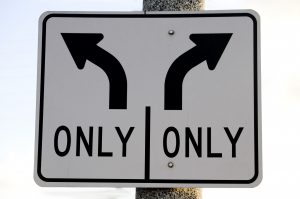The False Gods of Individual Freedom and Nature

From anti-immigration in Europe to anti-vaxxers in the US and elsewhere, the strange phenomenon of so-called “horseshoe theory politics” continues to rear its head. Though many have a problem with this theory of politics, the question still remains: How is it that the far left and the far right can meet together on certain political issues? Regardless of the validity of this theory and the purpose for its utilization, I do want to explore one idea of what might lead to such strange bedfellows. My simple thought experiment is that individual freedom on the “right” of politics turns out to serve the same political purposes as “nature” and what is “natural” on the left. It turns out sticking with the complex, middle ground may be more radical than either extreme proclaims to be.
In a recent Guardian article, George Monbiot explores the strange phenomena of left-wingers getting caught up in right wing conspiracy theories. Part of this, he suggests, is that both on the left and the right, people have become exhausted by the power and lies of big business and/or big government, respectively. Big business and neoliberal politics and economics as usual continue to lead to mass economic inequity and the destruction of the planet. This, for many who are left leaning, including myself, is unacceptable. However, the foundation on which many on the far left make such a judgement is often based upon a naïve understanding of “nature,” and what is natural. As many have pointed out, making value judgements and basing one’s politics on an understanding of pure “nature” that is mistaken with what is universal Nature, is more than problematic. Just think about what has been designated as “natural” and “unnatural” throughout various histories and cultures. What has historically been claimed as within a “woman’s nature” or a “man’s nature.” What sexualities have been described as unnatural or natural? What races have been thought to be naturally superior or inferior? What able bodies have been described as “natural,” and which ones have been thought of as defective from that natural body?
Most on the far left would not agree with such discriminatory beliefs today, but many still base their value and ethical judgements on what is or is not “natural.” This has reared its head in terms of anti-vaxxer’s on the far left. It is unnatural to use medical technologies to vaccinate against things because this upsets some understanding of the “natural body.” This might also be extended to things as GMO’s: don’t mess with the “natural” order of plants by intervening technologically. Nature, then, is the pure foundation, the paradise, the revered god/goddess which should be obeyed, worshipped, and venerated, not tinkered with. Underneath this assumption, however, are some more pernicious assumptions: a) humans and their technologies are somehow not nature, and b) one can have an unmediated experience of and therefore direct knowledge of Nature. Both assumptions, that of human exceptionalism and of the capacity for humans to have objective knowledge of nature, have created a host of atrocities in the past. In fact, many would argue that human exceptionalism is the primary cause of environmental degradation today, in the same way that many would argue uncritical knowledge of Nature mistaken as objective knowledge is the continuation of a colonial attitude toward other peoples and the rest of the natural world.
The far right is also guilty of these same problems: human exceptionalism and an ongoing colonial mindset. However, I’d argue their source is not an uncritical understanding of Nature, but rather an uncritical understanding of Individual Freedom. The far right, for instance, is much more critical of “big government” infringing upon individual freedoms than limiting “big business.” The assumption here, the neoliberal one as well, is that each individual left to his/her own will bring about the best possible world. Underlying this are, of course, ideas of what it means to be “human” and where agency lies. Some might argue, including myself, that at least in the western monotheistic traditions of Judaism and Christianity, the idea of the individual is tied up with what it means to be made in the “image of god.” Only humans are made “in the image,” and therefore they are exceptional to the rest of the natural world. This leads to the idea of humans as managers or stewards of creation, in Christianity and Judaism, and as viceregents in Islam (though Islam does not share this imago Dei tradition, there is still a strong understanding of human beings as in a special place vis-à-vis the rest of the natural world). Again, this form of human exceptionalism leads to an understanding of humans as somehow in a privileged position “above” nature, which easily leads to an understanding of non-human nature as existing mostly for human use.
On top of this is the unique narrowing of the individual human in western Enlightenment and Modern thought to that of the radical individual: each human has the right to act and make decisions according to his own ability to reason. I say “he” because this is a patriarchal, European, white, and economically advantaged understanding of the individual human. From this perspective, all are created equal (as blank slates perhaps) and thus have equal opportunity to succeed economically and politically in the world. This, again, is the neoliberal understanding of the “isolated individual,” and it ignores the history of colonization, genocide, and racism toward peoples that were at times not considered to be “human.” There is a way in which those from this privileged perspective of what it means to be human mistake their own “humanity” with “Humanity,” similar to how those on the left mistake their understanding of “nature” with “Nature.” In the end, no government should intervene in this divine image of the individual: whether that is taking away the rights to bear arms or mandating that one be vaccinated during a pandemic. Individual freedom here, serves as the uncritical foundation from which one makes decisions about politics and reality.
If uncritical understandings of “nature” and “individual freedom” end up perpetuating a politics that outsources responsible actions to the sacred cows of individual freedom (on the right) and nature (on the left), then perhaps a messier understanding of life is called for. The understanding of the individual and individual freedom that also is the foundation for the neoliberal understanding of the self is not complex enough to deal with the ways in which we are relational through and through, and the ways in which our embodiments in the world are privileged differently based upon race, sex, sexuality, gender, economic class, and ability. We are deeply intertwined with evolutionary and ecological flows of energy and information, not to mention the histories of languages and cultures into which we are born. Similarly, if one mistakes an understanding of “nature” with Nature, then he/she/they are not paying attention to the ways in which we experience the world differently depending upon our embodiments, nor the ways in which humans, cultures, and technologies are also part of the rest of the natural world. There is no pure nature that we have unmediated access to, and there is no isolated individual (if there were we would not know of their existence). These realizations not only undermine the political claims on the far right and far left, but they shift the whole spectrum of political discourse away from the neoliberal assumptions at the center of western democratic politics and perhaps toward the messier, planetary community of which we are all a part.
#
Whitney A. Bauman is Co-Founder and Co-Director of Counterpoint: Navigating Knowledge, and Associate Professor of Religious Studies at Florida International University. He is the co-author (with Kevin O’Brien) of Environmental Ethics and Uncertainty: Wrestling with Wicked Problems (Routledge 2019), and Religion and Ecology: Developing A Planetary Ethic (Columbia University Press, 2014).
Counterpoint blogs may be reprinted with the following acknowledgement: “This article was published by Counterpoint Navigating Knowledge on 12 October 2021.”
The views and opinions expressed on this website, in its publications, and in comments made in response to the site and publications are those of the author(s) and do not necessarily reflect the views and opinions of Counterpoint: Navigating Knowledge, its founders, its staff, or any agent or institution affiliated with it, nor those of the institution(s) with which the author is affiliated. Counterpoint exists to promote vigorous debate within and across knowledge systems and therefore publishes a wide variety of views and opinions in the interests of open conversation and dialogue.
Photo credits: Public domain image.



